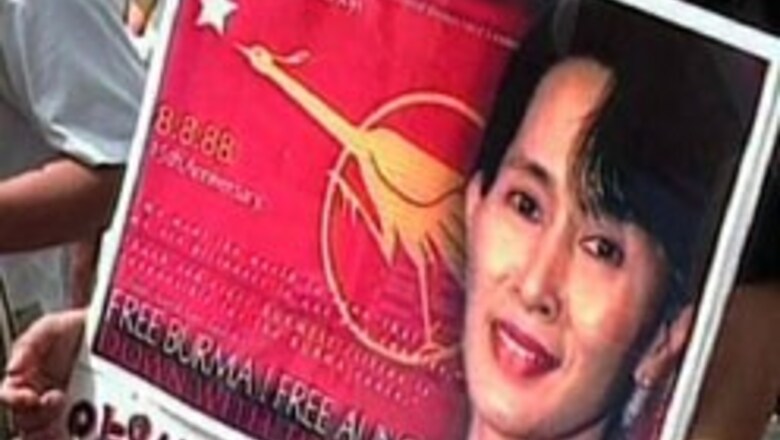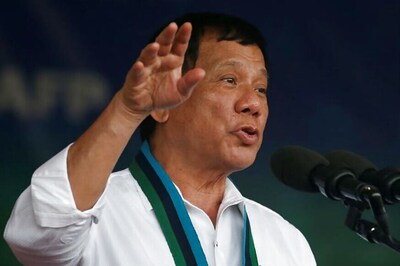
views
Yangon (Myammar): Myanmar's ruling military extended the house arrest of pro-democracy leader Aung San Suu Kyi on Saturday by one year, a government official said, in a move that defied international pressure to free the Nobel laureate.
UN Secretary-General Kofi Annan and other supporters of Suu Kyi had been hopeful she would be released when the order for her detention expired on Saturday.
But a government official said the order had been extended for one year. The official spoke on condition of anonymity because he wasn't authorised to discuss the case with the media.
About 200 Suu Kyi supporters, mostly young members of her National League for Democracy Party, gathered at a roadblock about 150 meters from her lakeside residence on University Avenue in Yangon in hope of seeing her released on Saturday.
They shouted cheers in her honour but dispersed peacefully after uniformed riot police armed with batons told them she had not been freed.
"This is a big disappointment and a major setback to national reconciliation," said Nyan Win, a spokesman for National League for Democracy. "The extension is exactly opposite of what we expected."
Suu Kyi, who has spent about 10 of the last 17 years in detention, was most recently taken into custody on May 30, 2003, after her motorcade was attacked by a pro-junta mob as she was making a political tour of northern Myanmar.
The junta took power in 1988 after crushing vast pro-democracy demonstrations in the country formerly known as Burma.
In 1990, it refused to hand over power when Suu Kyi's party won a landslide victory in general elections.
Since then, the United States and many Western nations have shunned the junta because of its poor human rights record and failure to hand over power. The government's rationale for detaining Suu Kyi has been that she could be a threat to public order.
Suu Kyi's eloquence and popularity have made her a dangerous rival in the eyes of the military. Even before the 1990 election proved her party's popularity, she and several close colleagues were detained on trumped-up national security charges in an effort to curb the opposition.
While under house arrest, her party still managed to score a landslide election victory, and she won the 1991 Nobel peace prize for her nonviolent efforts at promoting democracy.
Neither accomplishment moved the military. She remained under house arrest, and the military refused to hand over power to her party, instead stepping up harassment and arrests of its members.
The generals who run the country have continually insisted that they are guiding the country back to democratic rule.
PAGE_BREAK
But there are few signs that the ruling junta is willing to pick up the pace of its self-proclaimed road map for democracy, which calls for a constitution and free elections at some unspecified point in the future.
Annan, visiting neighboring Thailand on Friday, appealed to Myanmar junta chief Senior Gen. Than Shwe "to do the right thing" and free Suu Kyi to "allow the government and the people, not only to build the nation together, but to focus on the essential issue of economic and social development".
Hopes had run high that Suu Kyi would be released after a recent visit by UN Undersecretary-General Ibrahim Gambari, who became the first foreigner in more than two years to see Suu Kyi.
Suu Kyi has been held at her Yangon residence and rarely allowed visitors or telephone contact with the outside.
The top diplomats of two of Myanmar's neighbors in Southeast Asia, who had been hopeful for her release, were disappointed to hear of the extension.
"I was hoping the release should come today. It was a good opportunity. We would like to see Myanmar back in the realm of the international community, so progress in national reconciliation is something of importance," said Foreign Minister Kantathi Suphamongkhon in Thailand.
Malaysian Foreign Minister Syed Hamid Albar told reporters, "I am very surprised. I was hoping that they would not extend the house arrest. But that is their right. Of course, we are disappointed."
However, skeptics had suggested that a release soon was highly unlikely, since it coincides with several anniversaries around which opponents of the junta could rally.
Saturday is the anniversary of the NLD's election victory, which the party plans to mark at its headquarters in Yangon.
Party members had gained hope for the release from an unusual comment this past week by Myanmar national police chief Major General Khin Yi, who said Suu Kyi was unlikely to be able to draw large crowds because support for her had dwindled over the years.
"I can handle every situation. There will not be rallies and riots in Myanmar if Aung San Suu Kyi is released," Khin Yi said on the sidelines of a regional security conference in Kuala Lumpur, Malaysia.


















Comments
0 comment